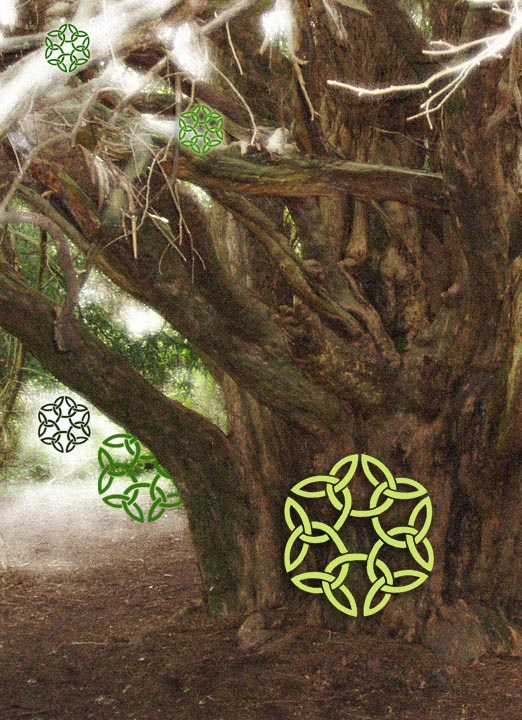Resting Place
by Bill West
Illustration by Mary Pat Mann

The iron gate clangs behind me, startling rooks which crackle into the sky. My boots crunch on gravel, throwing echoes about this quiet graveyard. The church’s stone face blushes in the sunlight filtering through the dense canopy of an ancient yew.
In the porch is a notice telling of the yew’s great age, its girth, that it pre-dates the church’s Norman tower.
I lift the iron ring of the church’s oak door, massive and smoothed by the touch of many hands. Always an anxiety, a flash of fear before the door opens into shadow, a fear from childhood. Perhaps God waits inside, with his judgment and his wrath. As a child, I ran from church, the words repeating in my head, “God is watching. God sees your sins.”
But no, it is a church like any other, smelling of damp and polish. A small parish church — stone pillars, high windows, slanting pale light, and a floor paved with memorials to the dead.
I count coins into the collection box. The typewritten card says, “Please make a donation toward the upkeep of this ancient building.”
I touch the stone font — Norman, like the one I was christened at long ago in a flint-clad church in Kent.
As I circle the font, I notice something on the floor. I nudge the curled shape, then stoop and pick up the dead mouse. The tiny body is cardboard stiff but the fur is soft. How did it get here? There is no food, unless there are grains behind the altar, left from Harvest Festival. Has it found a store of sacramental wafers, or found itself a sanctuary beneath the floor, with young ones nesting beside the highborn dead?
She can’t stay. If I leave her, she will be swept up, cast out with the morning coffee wrappers and dead flowers. I’ll find a better place for us sinners to rest.
I leave the church, the mouse cupped between my hands.
I had expected a three-thousand-year-old tree to be rotten, split open. But this is massive, vigorous, a multitude of trunks, twisting, lifting into the sky. I imagine seven maidens, arms outstretched, fingers barely touching, circling its bristled trunk.
I walk around it, like a pagan priest bearing an offering, stepping carefully, avoiding the sagging graves with their tilting headstones. Looking up, I see a twisting umbrella of branches, spiked with soft needles, a flourish of brown and green.
Here, out of view of the church, bark has peeled and dropped away, leaving sinuous wood, dark and polished, smooth as driftwood. Knotholes gape like gargoyle eyes.
I take out my penknife and scrape a shallow grave between the roots. I pat the mouse down in the dusty earth. I feel tired, my muscles remembering the steep walk here, my mind remembering the long walk back.
I sit and lean against the trunk. The rooks have all flown, and there is little sound, just the soft creak of branches stirred by a gentle breeze. A solitary hover-fly keeps station above me, winking in the rustling shade. The sun, warm on my face, makes me drowsy. Closing my eyes, I sink down to the brink of sleep. Shadows play across the thin veil of my eyelids; their Dryad forms twist and waver to the erratic beat of my heart.
Pain like a shaft of sunlight transfixes me. One last breath to last for eternity.
The yew tree gapes behind me, and maidens usher me in.
***
| Author Bio: Bill West lives in Shropshire, England, and is Group Host to the Write Words Flash Fiction Writers’ Group, and member of the Bridgnorth Writers’ Group and I*D Writers’ Group. His work has appeared on Flashshots, at Somewhat.org, The Lampshade, Quictiononline, Barfing Frog, FlashQuake, Heavy Glow and in Thirteen Magazine. |